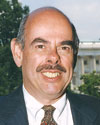While environmental groups are cheering the Environmental Protection Agency’s April 17 announcement that it has determined that greenhouse gases could pose a threat to public health and welfare, critics charge that using the Clean Air Act to regulate greenhouse-gas emissions could prove costly.
“Trying to regulate [greenhouse emissions] under the Clean Air Act is going to add costs and delays to transportation projects,” says Nick Goldstein, American Road and Transportation Builders Association assistant general counsel and director of regulatory affairs.

WAXMAN
EPA’s “endangerment” finding, which is subject to a 60-day comment period before it becomes final, is not a formal rule. But it could trigger regulation of greenhouse gases for the first time under the Clean Air Act if Congress does not pass legislation to address global warming.
EPA’s endangerment finding, a reversal of Bush administration policy, came in response to the 2007 Supreme Court ruling in Massachusetts v. EPA. The court concluded that carbon could be considered a “pollutant” under the Clean Air Act and ordered EPA to determine whether carbon emissions constitute an “endangerment” to public health. Former EPA Administrator Stephen Johnson said during the final weeks of the Bush term that using the act to regulate greenhouse gases could have a chilling effect on the economy but left the determination of whether greenhouse gases pose a potential health threat to the next administration.
Environmental groups say the EPA announcement lays the groundwork for addressing the effects of climate change, through the regulatory or legislative process. Joe Mendelson, National Wildlife Federation global-warming policy director, calls EPA’s finding “a game-changer for climate policy that has repercussions domestically and abroad.”
The Obama administration repeatedly has said it would prefer that Congress take action rather than have its agencies issue regulations. In the House, Energy and Commerce Committee Chairman Henry Waxman (D-Calif.) and Rep. Ed Markey (D-Mass.) have released a draft bill. They hope the committee will vote on it by the Memorial Day recess.
Industry groups say they also prefer legislation. “That is our strong preference,” says Dan Riedinger, spokesman for the Edison Electric Institute. But the genie is out of the bottle. “One way or another, powerplants are going to be regulated, whether by agency or Congress,” he says.
ARTBA’s Goldstein says using the Clean Air Act to regulate greenhouse gases could push more counties out of attainment, which could stall funds for transportation projects. But David Doniger, climate center policy director for the Natural Resources Defense Council, notes, “The Clean Air Act is intended to adapt to new pollution problems as they are discovered and recognized.”


Post a comment to this article
Report Abusive Comment